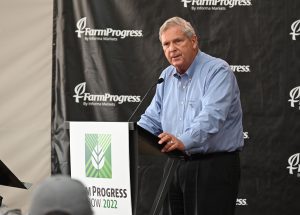 The Renewable Fuels Association (RFA) is showcasing its custom-made E85 vehicles at the Farm Progress Show, a 1200-hp flex-fuel Jeep Wrangler and the new Can-Am X3, both built by Kenny Hauk, owner of Hauk Designs.
The Renewable Fuels Association (RFA) is showcasing its custom-made E85 vehicles at the Farm Progress Show, a 1200-hp flex-fuel Jeep Wrangler and the new Can-Am X3, both built by Kenny Hauk, owner of Hauk Designs.
“These were both built on television programs, reaching the masses,” says Robert White, Vice President of Industry Relations. “There’s a lot of attention on the off-road side of things. Ethanol is one of those ways that can help clean up the air and allow you to do more and have more fun because the dollar stretches more when you’re using ethanol.”
White says RFA is excited about helping more retailers offer higher ethanol blends with the recent announcement of $100 million available under the Higher Blends Infrastructure Incentive Program and another $500 million in grants for higher-blend biofuels infrastructure in the “Inflation Reduction Act.”
“This will allow both E15 and E85 to find new consumers and new markets,” said White. “We’re helping over 20 different companies already with their application and we’re talking hundreds upon hundreds of stations in the works.”
The Farm Progress Show runs through the end of day today in Boone, Iowa.
FPS22 Interview with Robert White, RFA (3:08)














